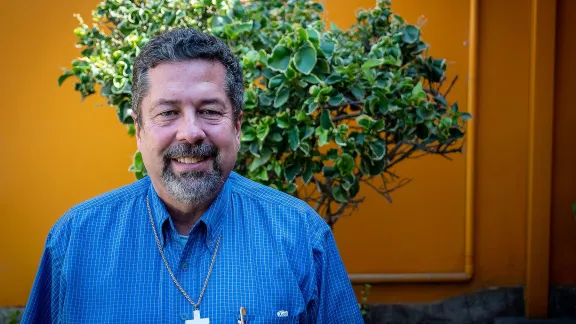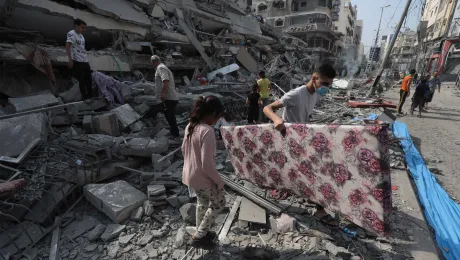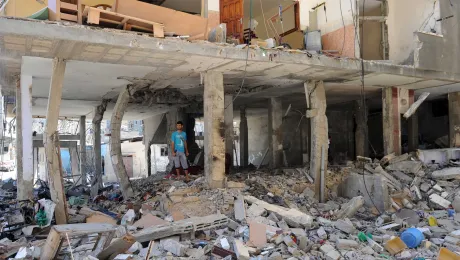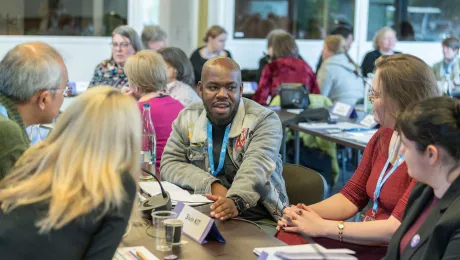
Pastor President of the IELV, Rev. Gerardo Hands Photo: LWF/A.Danielsson
Interview with Rev. Gerardo Hands, Pastor President of the Evangelical Lutheran Church in Venezuela
(LWI) - Bringing hope and practical support to people suffering as a result of the political and economic crisis in Venezuela. That’s how the Evangelical Lutheran Church in Venezuela (IELV) seeks to serve the population in the South American nation where food shortages are widespread, the public health system has collapsed and over three million people have fled the country.
Pastor President of the IELV, Rev Gerardo Hands Colmenares, explains how the crisis has affected the church and shares his hopes for a return to peace and democracy in the conflict-ridden nation.
Can you introduce yourself to us?
I started in the Evangelical Lutheran Church in Venezuela in 2002, visiting the congregation. I came from another Lutheran synod and was invited to preach by the then pastor, Brazilian Joao Willig, who was the president of the IELV at the time. He was on his way back to Brazil, so I had a trial period with the congregation for three months.
Since then, I have been in charge of a congregation in Venezuela and in 2013 I was called to be pastor president of the IELV. In December 2018 I was re-elected so I’m currently serving my second term.
Tell me in your own words about the difficult situation in Venezuela?
It’s a very difficult and complex picture. The social, economic and political situation affects the whole country and also our congregations that are scattered throughout the country. We are a small church, with only five congregations and only four pastors.
Most members of the church are now from the lower middle class, because many higher class people have returned to their countries of origin, especially to Europe. Others have emigrated to Chile or Argentina, and those with fewer resources have emigrated to Colombia, Ecuador and Bolivia, often taking their families as well.
How is this situation affecting the church?
It affects us directly, starting with the transportation shortages which cause problems for people who work with us in our school, for people trying to attend Sunday services. Increases in the cost of living, the lack of resources, all this has greatly affected the participation of people within the community. On a day-to-day basis, people have difficulties finding food, medicines and medical treatment and this makes it impossible for them to participate in our activities.
Our church population is currently is currently made up of mostly children and the elderly because so many young people have emigrated. Through our diaconal services we try to help those struggling to find enough food to eat.
Through our network Ielco and other organizations, we have obtained medicines for people who are insulin-dependent, or people who have kidney problems and need treatments. We also have a pre-school service for children and a home for kids at risk. We have seen that solidarity can also be an important sign of hope for people.
Have you been affected by the emigration of so many people, particularly educated professionals?
Yes, another difficulty we have is the migration of our teachers, our staff. Until two years ago, I knew the complete list of all of them, their names and surnames, and I visited them. But now, because of emigration, every two or three months the staff at the Colegio Venezolano Alemán changes completely, both Spanish and German teachers. We also have difficulties in Caracas where most German teachers were expelled, along with the German ambassador, because of the critical situation of the country.
We have an acute shortage of human resources, which is our most valuable asset. So many highly qualified, professional people have emigrated, and have been very well received by other countries, but we are left without that resource and it’s the greatest challenge we face in terms of reconstruction of the country.
Can you tell us a bit about the response of the church to these challenges?
Our main mission has always been the proclamation of the gospel, but that message also brings with it concrete actions so the work of diaconia and service to the community is much stronger now.
When the message of the gospel is made visible and shared within the community, bonds are strengthened and hope is also strengthened. We accompany people spiritually, through the trauma of loss of loved ones who have emigrated to other countries. We know that the God of all comfort is with us. We work for the personal transformation of people, so that they can also be transformers to others and bring hope too.
It has always been a symbol of hope, but it is in this critical situation that the testimony of the church becomes truly visible.
So the church is really a sign of hope in these difficult times?
It has always been a symbol of hope, but it is in this critical situation that the testimony of the church becomes truly visible. Our community is also strengthened and empowered to help others, with the result that we are seen as a reference for other people to approach and request some help or accompaniment.
What role can the church play today in the public space in Venezuela?
We are very small, so our influence in the public space is very small. At other times, we did have more influence because there were members of our churches who were in government or organizations or companies that exerted a marked influence. We are now down to a quarter, or less, of what we were five years ago.
Where would you like to see Venezuela in five years’ time and what do you think needs to happen for you to get there?
First of all, we need an agreement at economic and political level. Unfortunately, we currently have two executive powers, two legislative powers, two judicial powers. One is recognized worldwide, the other is not, but there are conflicts of interests for permanence in power.
The ideal for us would be free elections and the restoration of democracy in the country. We need the election of people without economic and political interests in power, but that is very difficult. For us, the challenge remains to stay and work every day to help our communities and, wherever possible, to do our bit to bring about change. One small step at a time, we can do something and a lot can be achieved.
The IELV has been a member of the LWF since 1986
The Lutheran World Federation is a global body that shares the work and love of Christ in the world. In this series, we profile church leaders and staff as they discuss topical issues and set out ideas for building peace and justice in the world, ensuring the churches and communion grow in witness and strength.


